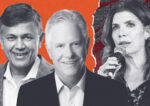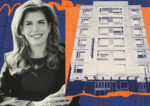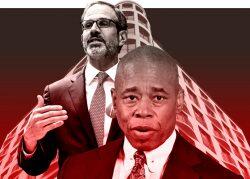If you ever felt unsafe in New York City, popping into the nearest hotel would be a smart thing to do. Hotels are always open, their front desks are staffed around the clock and cameras monitor the lobbies. Many even have panic buttons.
Yet this summer, out of the blue, Council member Julie Menin introduced a sweeping bill called the Safe Hotels Act.
Hotels are unsafe? Who knew?
It would be wrong to call the bill’s name deceiving, however: Absolutely no one was fooled.
Menin pointed to an increase in complaints about hotels from 2019 to 2023, but complaints about everything went up during the pandemic, during which the city moved homeless people and migrants into some hotels. Of course neighbors called 311 about them.
But hotels serving tourists and business travelers are as safe as ever. Last year, only 315 complaints were called in to 311 against the city’s 769 hotels — 0.4 per establishment. And they were concentrated in outer-borough hot-sheet hotels and shelters.
The same was true for crimes: The NYPD received 2,324 criminal complaints involving hotels last year, only three per establishment (and down 32 percent from the pandemic peak of 2021). But they were focused on a particular type of hotel, like those with hourly rates or homeless residents.
The “hotel safety” bill clearly had an ulterior motive. Not only are traditional hotels among the safest places to be, but a cursory reading of the legislation revealed its true purpose: to force hotels to hire staff for tasks they currently outsource, such as laundry and security.
The intended beneficiary was equally obvious: the Hotel and Gaming Trades Council, the union representing hotel workers.
The staffing requirement would devastate many of the city’s hotels because their overhead costs would soar. Hotels save money by using contractors — often small businesses — rather than paying full-time staff who would have nothing to do during slow periods.
The bill has other provisions that would hammer hotel operators and owners, but the real story here is its political backstory and botched rollout. They represent a case study in how to screw up a legislative campaign.
The measure dates back to before the pandemic, when Peter Ward led what was then called the New York City Hotel and Motel Trades Council. He had increased the union’s political power, but Ward, who passed the reins to Rich Maroko in 2020, left the Safe Hotels Act on the shelf. He realized the bill was a bigger bite than the union could safely swallow.
The labor group instead focused on persuading the City Council and de Blasio administration to require all new hotels to get a special permit, which they did in 2021. That stopped the proliferation of nonunion hotels in its tracks and shielded current owners from new competition.
The “safety” bill, however, would have shattered the group’s informal peace with big hotel owners, which rely on outsourcing some labor. Before this summer’s snafu, the union and Hotel Association of New York had a tacit understanding that the union would advance the industry’s political agenda and the owners would stay out of the way, except to write checks as needed. The strategy was successful in getting the city to crack down on Airbnb listings.
But in the past two years, the union’s political momentum has seemed to fade, and it hasn’t organized workers at many of the city’s 300-plus nonunion hotels.
From this weakened position, Maroko inexplicably dusted off the “safety” bill and got Council member Julie Menin to introduce it. It was an absolute train wreck.
The choice of Menin as sponsor was, on its face, odd. She had precious few hotels in her Upper East Side district and was not tight with the union. But she aspires to succeed Adrienne Adams as City Council speaker, and the hotel workers union has the political heft to help or hinder her quest. So when the union asked Menin to jump, she asked, “How high?”
Too high, it turns out.
The bill was so extreme that it set off fire alarms in the hotel industry. Even the American Hotel and Lodging Association, which typically leaves New York City matters to Vijay Dandapani’s local owners group, went all-out to stop it.
Menin, totally unprepared for that reaction, was forced to cancel a City Council hearing for the bill — an embarrassment that Council insiders cannot remember happening before. A hearing is a crucial step for any bill, because nothing passes without one.
Some bills linger for years and never get a hearing, because they are blocked by a committee chair or the speaker. Menin’s bill, which seemed to be on the fast track, might now fall into that abyss. She has been stripping its most drastic provisions in an effort to salvage it, but the industry remains staunchly opposed.
The whole episode may damage Menin’s chances to become speaker of the City Council. Her rivals now have a stake in seeing her bill fail. Although they want the union’s support for their speaker bids, they also remember that union support for the previous speaker candidate, Francisco Moya, did not succeed in electing him.
Whatever happens, the Safe Hotels Act’s rocky debut is a reminder that city politics is rife with undercurrents that can whisk even experienced swimmers in unexpected directions.
This article has been updated to include NYPD data and to identify city call center 311 as the recipient of the 315 complaints called in about hotels last year.
Read more



